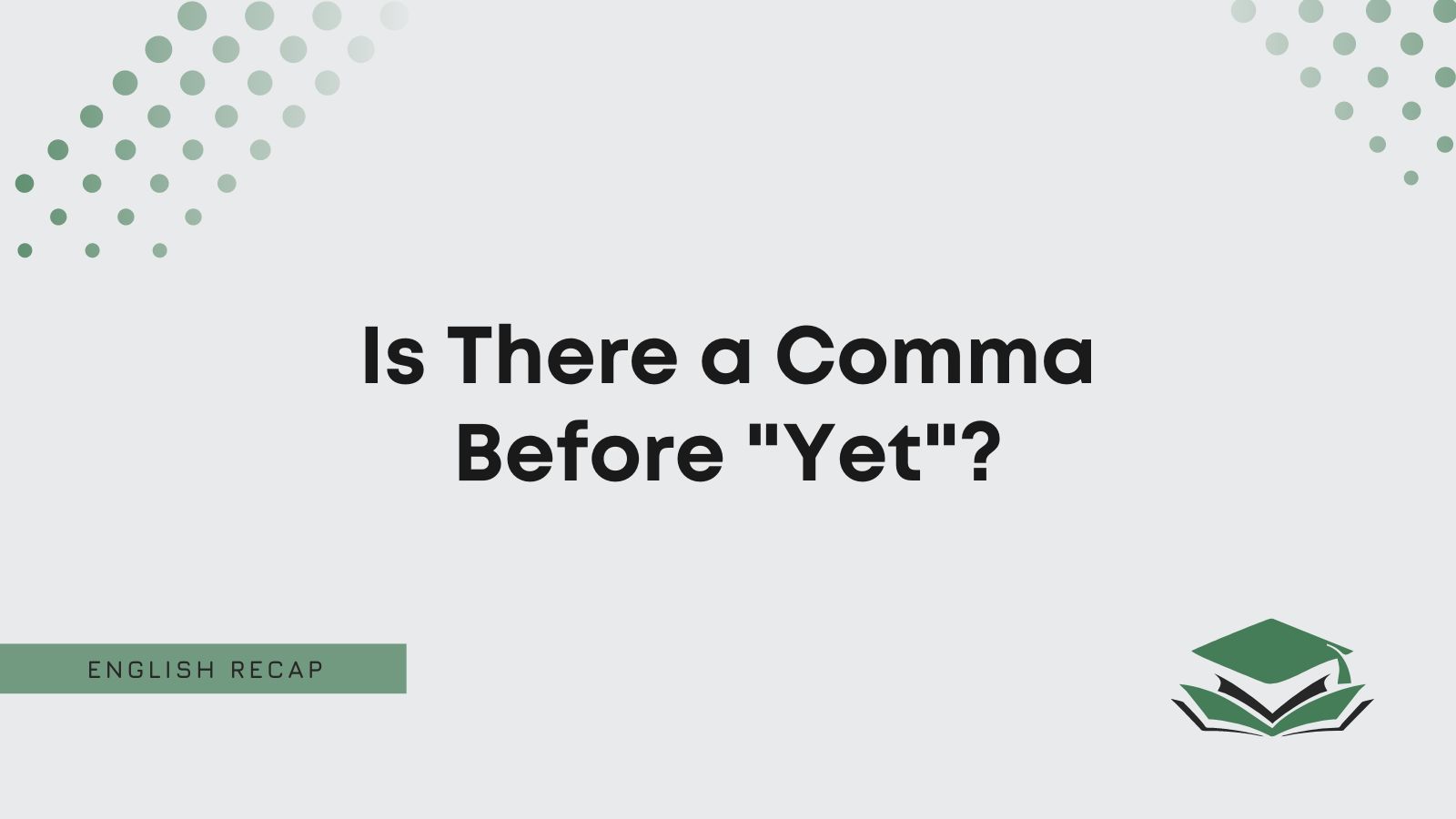Rule 1: Use a comma before “yet” when it links two independent clauses.
- Correct: Harry does a lot of exercise, yet he is overweight because of his diet.
- Incorrect: Harry does a lot of exercise yet he is overweight because of his diet.
Rule 2: Do not put a comma before “yet” when it is between two adjectives.
- Correct: He is strict yet fair.
- Incorrect: He is strict, yet fair.
Rule 3: Do not use a comma before “yet” when it is an adverb of time.
- Correct: Have you sent the report yet?
- Incorrect: Have you sent the report, yet?
Are you still in doubt about when you should use a comma with “yet”?
Continue reading so you can learn more about the different rules and see more examples of “yet” with and without commas.
We also have some good examples to show you how the rules work in practice.
When to Use a Comma Before “Yet”
When you need to decide when to use a comma before “yet,” you should refer to Rule 1.
Rule 1: Use a comma before “yet” when it acts as a conjunction to separate two independent clauses.
In this context, “yet” means something similar to “but,” and you should always put a comma when the second clause has a subject and a verb.
- Jane loves speaking English, yet she hates learning grammar rules.
- Maria is a very intelligent woman, yet she doesn’t have faith in her ability.
- I’ve lived in this city for ten years, yet I still get lost in the downtown area.
- She always wakes up early, yet she’s often late for appointments.
- The movie was three hours long, yet it didn’t feel tedious at any point.
- Tom is a vegetarian, yet he cooks meat for his family every weekend.
However, if you remove the subject from the second clause, it becomes dependent, and it is unnecessary to put a comma.
- Jane loves speaking English yet hates learning grammar rules.
- Maria is a very intelligent woman yet doesn’t have faith in her ability.
- I’ve lived in this city for ten years yet still get lost downtown.
- She always wakes up early yet often arrives late.
- The movie was three hours long yet felt engaging throughout.
- Tom is a vegetarian yet cooks meat dishes for his family.
Now, let’s see when to avoid a comma with “yet.”
When to Avoid a Comma With “Yet”
The following rules describe when it is not necessary to use a comma with “yet.”
Rule 2: You shouldn’t use a comma with “yet” when it separates two adjectives in a sentence.
In this function, “yet” provides the contrast between the adjectives.
Here are some examples:
- She is rich yet humble.
- The day was long and hard yet satisfying.
- The experiment was difficult yet enlightening.
- The cake was sweet yet not overly so.
- His speech was emotional yet measured.
Rule 3: You shouldn’t use a comma with “yet” when it is used as an adverb of time to indicate whether something has or has not been done.
For this meaning, the word “yet” usually appears at the end of a sentence and never has commas before it.
See these examples:
- He said that he hadn’t seen the movie yet.
- Have you taken the dog for a walk yet?
- I haven’t finished the assignment yet.
- She hasn’t called me back yet.
- They haven’t reached their destination yet.
Lastly, let’s see when to use a comma after “yet.”
When to Use a Comma After “Yet”
Rules 4 and 5 explain when you should use a comma after “yet.”
Rule 4: Use a comma after “yet” when it appears as the final word in an independent clause joined by a conjunction.
Here are some examples to better show you the rule:
- The performance was his best yet, but he still lost.
- He hasn’t done his work yet, and he says he isn’t going to do it.
- The band hasn’t performed in this city yet, so fans are excited.
- She hasn’t handed in her resignation yet, but she’s considering it.
- They haven’t discovered all the features yet, although they’ve had the software for a month.
Rule 5: Use a comma after “yet” when it is the first word in the sentence.
In these examples, “yet” will be referring to the previous sentence.
- She said it started at 3 p.m. Yet, when we got there, the place was empty.
- He always tries his best. Yet, he never passes exams.
- We thought the trip would be boring. Yet, it turned out to be an unforgettable adventure.
- I thought he was my ally. Yet, he proved me wrong in the meeting.
- The recipe seemed simple on paper. Yet, in practice, it was a challenging dish to master.
Conclusion
Put a comma before “yet” when it links two independent clauses. However, you shouldn’t put a comma when “yet” links adjectives or when it refers to time. Furthermore, put a comma after “yet” when it starts a sentence and when it is the final word in an independent clause.

